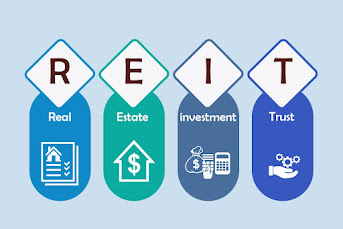
Foreclosure Effects in Middle Georgia: What Sellers Need to Know

Advantages of a cash home buyers in Ohio.
Recent in Technology
All About Real Estate Investment Trust (REIT)
Real Estate Investment Trust (REIT) is a security that sells like a stock and puts resources into real estate straightforwardly or by implication. Subsequently, there area different kinds of REITs; like Equity REITs and Mortgage REITs. The Equity REITs put resources into and own properties, and their income is connected to the lease.
How Do Novices Put Resources Into REITs?
Getting everything
rolling is pretty much as straightforward as opening a money market fund, which
normally requires only a couple of moments. Then, at that point, you'll have
the option to trade public REITs similarly as you would some other stock.
What Are The Drawbacks Of A Real Estate Investment Trust?
REITs Likewise Have A Few Downsides, Including:
Delicate to Demand for
Other High-Yield Assets. By and large, increasing loan fees could make Treasury
protections more appealing, drawing reserves from REITs and bringing down their
portion costs.
Local charges. REITs
should cover local charges, which can make up as much as 25% of complete
working costs. State and civil specialists could increment local charges to
compensate for financial plan setbacks and diminishing incomes to investors.
Charge Rates. One of the
drawbacks to the high return of REITs is that duties are expected on profits,
and the assessment rates are ordinarily higher than the 15% most profits are
right now charged at. This is on the grounds that a huge piece of a REIT's
profits (normally around 3/4, however it shifts generally by REIT) is viewed as
standard pay, which is typically charged at a higher rate.
What Occurs In A Real Estate Investment Trust?
Most REITs have a clear
plan of action: The REIT leases space and gathers rents on the properties, then
conveys that pay as profits to investors. Contract REITs don't claim the real
estate, yet finance real estate, all things being equal. These REITs procure pay
from the premium on their investments.
Could You At Any Point Lose Cash In A REIT?
Might You at any point
Lose Money on a REIT? Similar,y as with any investment, there is dependably a
gamble of misfortune. Public REITs have the specific gamble of losing esteem as
loan costs rise, which commonly sends investment capital into bonds.
Could I At Any Point Get Rich With REITs?
Putting resources into
Real Estate Investment Trusts (REITs) can furnish profit financial backers with
exceptional returns, consistently developing payouts, pleasant enhancement, and
an alluring revenue stream for retirement living. Nonetheless, REITs have
various intricacies and dangers that ought to be perceived prior to making any
investments.
Why You Shouldn't Put Resources Into REITs?
Putting resources into
REITs can be an uninvolved, pay-creating option in contrast to purchasing
property straightforwardly. In any case, financial backers ought not to be
influenced by enormous profit installments since REITs can fail to meet the expectations of the market in an increasing loan fee climate.
Are REITs Better Than Investment Properties?
REIT Pros. Maybe the
greatest benefit of purchasing REIT shares as opposed to investment properties
is effortlessness. REIT putting considers partaking in esteem appreciation and
rental pay without being engaged with the issue of really purchasing,
overseeing, and selling property. Expansion is another advantage.
How Does A REIT Bring In Cash?
REITs bring in their cash
through home loans hidden real estate advancement or rental earnings
once the property is created. REITs give investors consistent pay and, assuming
held long haul, a development that mirrors the enthusiasm for the property it
possesses.
Are REITs A Wise Investment In 2022?
Income and assets from
tasks (FFO) have really expanded for the majority of these REITs while real
estate values have remained moderately stable for the year, demonstrating that
the net resource esteem (NAV) of these organizations has likely worked on in
2022.
How Much Cash Do You Have To Put Resources Into A REIT?
Confidential REITs might
have an investment least Sell your house, and that regularly runs from $1,000 to $25,000, as
indicated by NAREIT, the National Association of Real Estate Investment Trusts.
Risk: Private REITs are frequently very illiquid, meaning it tends to be hard
to get to your cash when you really want it
Which REITs Deliver Month-to-month Profits?
REITs That Pay Out
Monthly
- AGNC Investment Corp. ( AGNC)
- Apple Hospitality (APLE)
- Bluerock Residential Growth (BRG)
- EPR Properties (EPR)
- LTC Properties (LTC)
- STAG Industrial (STAG)
People
Most Popular

Top Ways to Save Money When Selling Your Home in Baldwin County, Georgia

What to avoid if you want to sell a house quickly?

Connect Home Buyers – Your Trusted Real Estate Partner
Search This Blog
Blog Archive
- January 2025 (8)
- December 2024 (4)
- November 2024 (2)
- July 2024 (1)
- May 2024 (1)
- March 2024 (1)
- February 2024 (1)
- January 2024 (3)
- December 2023 (2)
- September 2023 (2)
- January 2023 (1)
- December 2022 (7)
- November 2022 (11)
- October 2022 (2)
- September 2022 (18)
- August 2022 (21)
- July 2022 (14)
- June 2022 (4)
Tags
- Cash Buyers in Georgia
- Cash Buyers in idhao
- cash home buyers in kansas
- cash home buyers in oregon
- cash home buyers in south carolina
- cash home Buyers in texas
- Cash home Buyers in washington
- cashhomebuyersinGeorgia
- cashhomebuyersinwashington
- dallas cash home buyers
- HomeBuyers
- HomeBuyingTips
- HomeInspection
- PropertyInvestment
- Real Estate Investments Trust
- RealEstateExperts
- RealEstateInvesting
- RedHeadHomeProperties
- Sell your house for cash
- sell house fast in utah
- sell my house utah
- sell your damaged houses
- Sell your distressed Property
- Sell your house fast in Macon
- Sell your house for cash
- Sell your house for cash in GA
- Sell your house for cash in kansas
- Sell your house for cash in warner robins
- Sell your house for cash in washington
- sell your house in dallas
- Sell your house in georgia
- sell your house in Houston county Georgia
- Sell your house in kansas
- Sell your house in ohio
- sell your house in texas
- Sell your house in warne Robins GA
- sell your inherited house in texas
- sellyourdamagedhouse
- Sellyourhomedivorce
- sellyourhouseasisinwashington
- Sellyourhouseforcashinwashington
- sellyourhouseinspokane
- Sellyourhouseinwashington
- Sellyourhousesfastinmiddlegeorgia
- Sellyourhousewithoutagent
- Sellyourinheritedhouse
- SepticSystemCheck
- SepticTankInspection
- SepticTankInspectionCost
- texas cash home buyers
- trusted cash home buyers in ks
- we buy homes utah
- we buy house
- We buy house utah
- we buy houses
- we buy houses for cash in ohio
- we buy houses for cash in texas.
- we buy houses in kansas
- Webuyhousesforcash
- webuyhousesinwashington
- Webuymiddlegahouses
Categories
- Cash Buyers in Georgia (34)
- Cash Buyers in idhao (9)
- cash home buyers in kansas (3)
- cash home buyers in oregon (1)
- cash home buyers in south carolina (1)
- cash home Buyers in texas (4)
- Cash home Buyers in washington (3)
- cashhomebuyersinGeorgia (1)
- cashhomebuyersinwashington (8)
- dallas cash home buyers (1)
- HomeBuyers (1)
- HomeBuyingTips (1)
- HomeInspection (1)
- PropertyInvestment (1)
- Real Estate Investments Trust (16)
- RealEstateExperts (1)
- RealEstateInvesting (1)
- RedHeadHomeProperties (1)
- Sell your house for cash (43)
- sell house fast in utah (1)
- sell my house utah (1)
- sell your damaged houses (42)
- Sell your distressed Property (39)
- Sell your house fast in Macon (47)
- Sell your house for cash (36)
- Sell your house for cash in GA (14)
- Sell your house for cash in kansas (1)
- Sell your house for cash in warner robins (7)
- Sell your house for cash in washington (6)
- sell your house in dallas (1)
- Sell your house in georgia (22)
- sell your house in Houston county Georgia (2)
- Sell your house in kansas (1)
- Sell your house in ohio (1)
- sell your house in texas (3)
- Sell your house in warne Robins GA (6)
- sell your inherited house in texas (1)
- sellyourdamagedhouse (1)
- Sellyourhomedivorce (2)
- sellyourhouseasisinwashington (6)
- Sellyourhouseforcashinwashington (2)
- sellyourhouseinspokane (4)
- Sellyourhouseinwashington (4)
- Sellyourhousesfastinmiddlegeorgia (16)
- Sellyourhousewithoutagent (1)
- Sellyourinheritedhouse (8)
- SepticSystemCheck (1)
- SepticTankInspection (1)
- SepticTankInspectionCost (1)
- texas cash home buyers (1)
- trusted cash home buyers in ks (1)
- we buy homes utah (1)
- we buy house (1)
- We buy house utah (1)
- we buy houses (1)
- we buy houses for cash in ohio (1)
- we buy houses for cash in texas. (1)
- we buy houses in kansas (1)
- Webuyhousesforcash (12)
- webuyhousesinwashington (3)
- Webuymiddlegahouses (20)
Ad Code
Popular Post

Top Ways to Save Money When Selling Your Home in Baldwin County, Georgia

Foreclosure Effects in Middle Georgia: What Sellers Need to Know

Advantages of a cash home buyers in Ohio.
Labels
- Cash Buyers in Georgia
- Cash Buyers in idhao
- cash home buyers in kansas
- cash home buyers in oregon
- cash home buyers in south carolina
- cash home Buyers in texas
- Cash home Buyers in washington
- cashhomebuyersinGeorgia
- cashhomebuyersinwashington
- dallas cash home buyers
- HomeBuyers
- HomeBuyingTips
- HomeInspection
- PropertyInvestment
- Real Estate Investments Trust
- RealEstateExperts
- RealEstateInvesting
- RedHeadHomeProperties
- Sell your house for cash
- sell house fast in utah
- sell my house utah
- sell your damaged houses
- Sell your distressed Property
- Sell your house fast in Macon
- Sell your house for cash
- Sell your house for cash in GA
- Sell your house for cash in kansas
- Sell your house for cash in warner robins
- Sell your house for cash in washington
- sell your house in dallas
- Sell your house in georgia
- sell your house in Houston county Georgia
- Sell your house in kansas
- Sell your house in ohio
- sell your house in texas
- Sell your house in warne Robins GA
- sell your inherited house in texas
- sellyourdamagedhouse
- Sellyourhomedivorce
- sellyourhouseasisinwashington
- Sellyourhouseforcashinwashington
- sellyourhouseinspokane
- Sellyourhouseinwashington
- Sellyourhousesfastinmiddlegeorgia
- Sellyourhousewithoutagent
- Sellyourinheritedhouse
- SepticSystemCheck
- SepticTankInspection
- SepticTankInspectionCost
- texas cash home buyers
- trusted cash home buyers in ks
- we buy homes utah
- we buy house
- We buy house utah
- we buy houses
- we buy houses for cash in ohio
- we buy houses for cash in texas.
- we buy houses in kansas
- Webuyhousesforcash
- webuyhousesinwashington
- Webuymiddlegahouses
Featured post

Sell Your House Fast in Columbia, SC – Hassle-Free & Fair Cash Offers
Are you looking to sell your house fast Columbia , SC ? At BirdDog Investment Group ,…
Popular Posts

Top Ways to Save Money When Selling Your Home in Baldwin County, Georgia

What to avoid if you want to sell a house quickly?












0 Comments